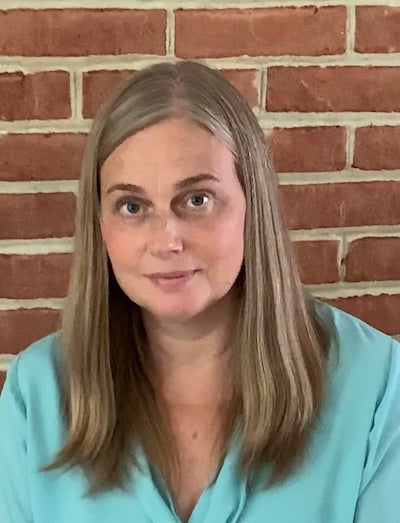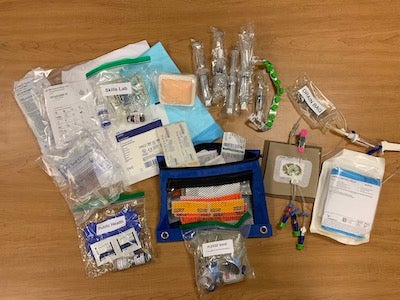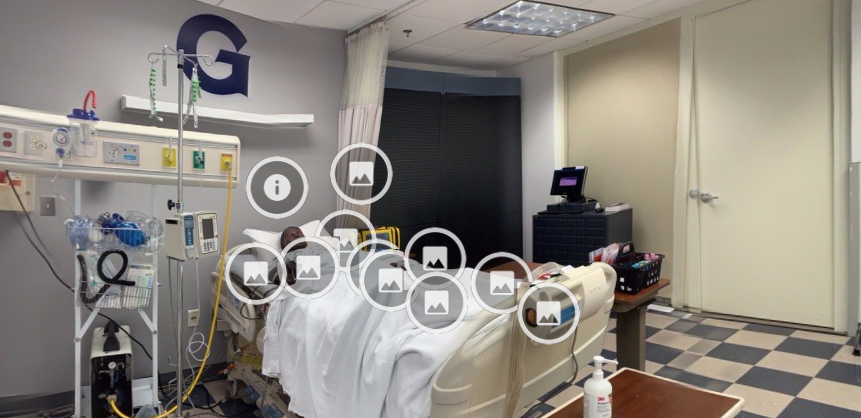O’Neill Family Foundation Clinical Simulation Center Goes Virtual During Pandemic
September 21, 2020 – As the COVID-19 pandemic unfolded, Kelli Giffin closely focused on the issue of how to continue offering dynamic clinical simulation activities for nursing students at the School of Nursing & Health Studies.
A nurse, Giffin manages the O’Neill Family Foundation Clinical Simulation Center in St. Mary’s Hall, an experiential learning laboratory that includes high-fidelity patient simulation and standardized patient encounters, and houses a hospital ward and clinical examination and debriefing rooms.

For countless hours over months, Giffin has worked to conceptualize and create a web-based simulation tool, using Google’s Tour Creator, Google Sites, YouTube, and a camera — first her own and then a more advanced one from the Gelardin New Media Center in Lauinger Library.
“How can we make a difference at Georgetown,” Giffin recalls asking herself. “We really need to be very thoughtful about the students’ education and making sure that we’re giving them all we can. So I started thinking about it, and I’ve just slowly been developing the simulations.”
Multifaceted Experience
Looking back, Giffin is both amazed by and proud of the web portals she has created. Students and faculty — all from a distance — select one of the virtual simulation sites Giffin has set up (which reflect simulations that have been previously conducted on campus) using her 360-degree photos, videos, and audio files.
The simulations are entitled “Room of Errors,” “Multiple Patient Scenario,” “Fundamentals Simulation,” and “Medication Review,” and Giffin said she is developing another to help students practice administering intravenous fluids and medications.
Students progress through the scenarios, make decisions as a part of the learning process, and receive feedback from Giffin and their professors. The electronic health record system they are accustomed to is a part of the portal, as is the medication administration record. There is also an online form to help Giffin collect feedback from the students to think about ways to improve the experience.
Giffin said she is especially excited that students have received an at-home kit of simulation supplies (for example, fake medications) that allow them to practice hands-on skills that they are seeing demonstrated in the virtual world.
“These are very individualized bags,” Giffin said. “I put a lot of thought into these bags for each cohort. So the seniors have a very different bag from the juniors. The juniors have a very different bag from the CNL [clinical nurse leader] students that are in their second year. Everything is labeled. Everything is very much organized, and the students can really get in there, and they have been extremely happy with it so far.”

Giffin added she is also enthusiastic about the way virtual simulation has allowed her to help the students grasp difficult concepts related to prioritization of responsibilities and tasks, something they do as individuals and then together as a group.
‘Never Deterred’
Colleagues and students have offered praise for Giffin’s dedication and creativity.
“Kelli is never deterred by the mountain in her path, she finds a way to go around or over it,” said Dr. Edilma Yearwood, chair of the Department of Professional Nursing Practice. “Her skills have been invaluable to the successful implementation of virtual simulation during this extraordinary time of the COVID pandemic.”
Professor Margaret Granitto, an instructor in the department, noted that Giffin has been a real leader in ensuring that students receive the clinical experiences they need in order to progress through their programs.
“Kelli has developed many engaging and challenging virtual simulations that we have been able to use during our time of virtual learning,” Granitto said. “She has created a Hoya-centric simulation program that enables our students to learn in new and exciting ways. Through Kelli’s simulations, our students have been able to practice technical skills and clinical reasoning on ‘real life’ patient problems that they will encounter in their practice.”
‘A World of Difference’
One of the students, senior nursing major Katelin McDaniel (NHS’21), said that she, as “a very tactile and visual learner,” has thoroughly enjoyed the virtual simulation experience.
“Participating in the online simulation . . . made me feel like I was back in the sim lab for the first time since March,” McDaniel said. “It was so interactive and kept me engaged, something I also tend to struggle with after hours and hours of Zoom classes. I was also able to learn a lot in a relatively short amount of time.”
Through the experience, McDaniel improved skills such as writing an incident report and handling tubing.
“Learning during COVID is really hard,” she said. “It’s mentally and emotionally taxing, but things like this really make a world of a difference and really cater to students that may learn better in different ways.”
By Bill Cessato
- Tagged
- COVID-19

